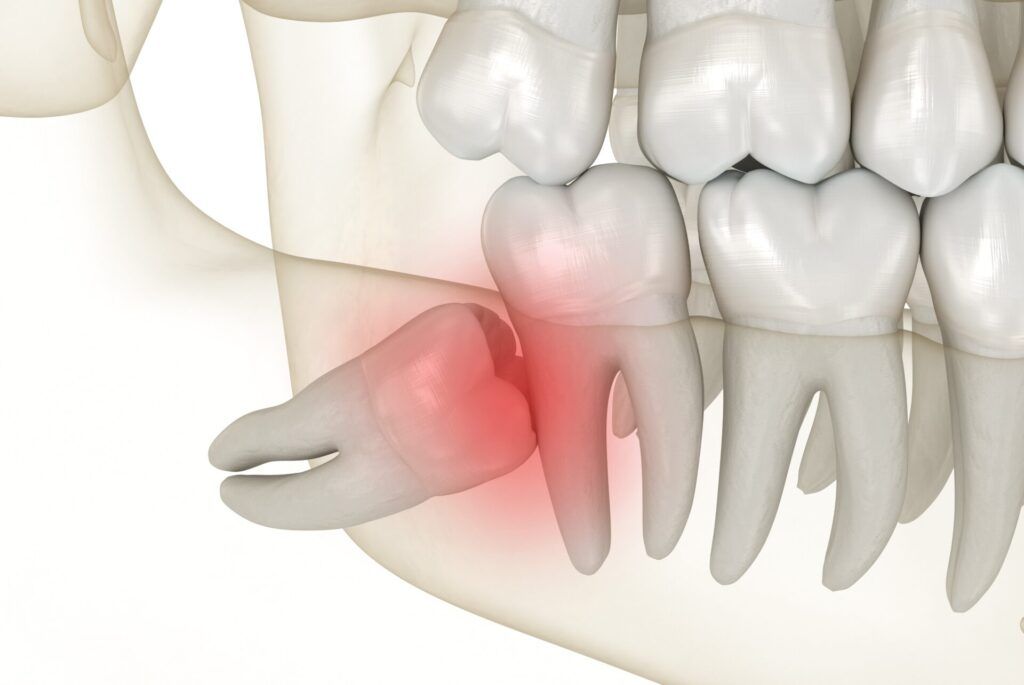
Teeth extraction

Wisdom teeth are the most complicated and the most studied teeth in the oral cavity. Not for nothing they say: the less wisdom teeth you have, the less problems you suffer. The removal of wisdom teeth is one of the routine interventions in modern dentistry.
Eighth teeth or third molars are also called wisdom teeth as their eruption occurs when a person already is a grown-up. Wisdom teeth erupt at the age of 18 to 25. Problems with wisdom teeth patients begin to suffer due to lack of space in their oral cavities. With the change of the modern food, which is now softer, chunkier, easier to chew, jaws gradually became narrower during the evolutionary process. However, the number of dental nucleus has remained unchanged. The progression of the evolution envisages that the eighth teeth will once completely disappear from the human mouth.
Wisdom teeth extraction
Diagnostics
The necessity for removal of a wisdom tooth is considered individually, assessing the particular situation, including:
- Patient’s age and health status
- The position of the tooth against the anatomical structures
- Possibility of complications
- Probability of dental eruption
- Wisdom tooth position in the bone
- Possibility of pathologies
Complications
When planning a removal of a wisdom tooth, patients should be aware of some limitations in regard to social life a few days after the dental extraction:
- Swelling
- Discomfort
- Pain in the respective oral cavity area
- Difficulty opening mouth
- Fever
- Weakness
In cases of extraction of third molars, complications occur in 7-20% of cases. In young patients, extraction wounds heal better.
Wisdom teeth extraction indications

- Removal of decayed wisdom teeth
- Infection around soft tissue of the wisdom tooth (gingival inflammation, gingival “cap”, pocket)
- Abnormal formations (e.g., cysts)
- Prolonged pain, pressure
- Decayed adjacent tooth
- Compression of anteriors (front teeth)
- Preventive measures in case of orthodontic straightening of teeth
- Mandibular angle fracture
- Impacted wisdom teeth under prosthesis
Dental extraction is a procedure of teeth extraction when restoration of the teeth is no longer possible due to defects, damages or pathology. A tooth gets seldom extracted in framework of orthodontic treatment or prosthetic plan.
Recovery after manipulation
- Avoid eating, drinking or rinsing for two hours
The next 24 hours after dental extraction:
- The next 24 hours after dental extraction:
- Avoid sharp, sticky or crisp foods, as well as carbonated drinks
- Avoid saunas, sports and physical activities for the first two / three days
- Avoid touching the wound with your tongue
- Use medication prescribed by your doctor
The following day:
- Rinse your mouth with a disinfectant such as saline water or chlorhexidine mouthwash (as directed by a doctor)
- If the wound continues to bleed, please contact your dentist
- Important!!! Brush the rest of your teeth and keep the wound clean.
Teeth extraction
Procedure description
- The patient has a local anaesthesia applied and in case of such a wish a laughing gas anaesthesia is available to make the procedure easier and more enjoyable.
- A gum is removed from the tooth to aid access to the tooth.
- The damaged tooth is removed by special instruments.
- The scar is processed with medicine to facilitate healing.
Remember!
- After a tooth has been retracted the scar may be sensitive, painful or swollen.
- If the symptoms do not disappear during a couple of days a dentist must be seen.
- On the day of dental extraction consuming of hot food as well as sauna are not suggested.
- On the day of dental extraction and two days afterwards an ultimate physical load should be avoided.
- On the first day the mouth must not be rinsed not to swill out the clot from the wound.
- The teeth should be brushed carefully on the respective day without touching the wound.
- From the next day on the wound must be rinsed with camomile tea or salt-water.
Prices
Tooth extraction
Tooth extraction
Wisdom tooth extraction
Root tip resection
Anesthesia
Wand STA anesthetic





